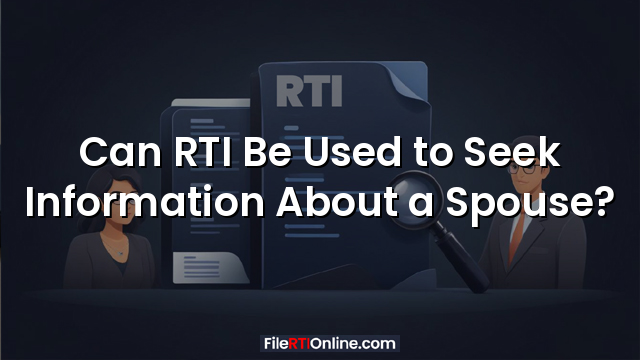Can RTI Be Used to Seek Information About a Spouse?
One of the most common questions in family-related disputes is whether a husband or wife can use the Right to Information (RTI) Act to obtain financial or personal details about their spouse. The issue becomes especially relevant in situations involving maintenance disputes, hidden income, tax concealment, or marital conflict.
A key question arises:
Is a spouse treated as a “third party” under the RTI Act?
A significant decision of the Central Information Commission (CIC) helps clarify how the law is applied in such situations. This article explains the legal position, the CIC’s reasoning, and what citizens can practically expect.
Understanding the Context
An appellant sought information from the Income Tax Department about her husband, including:
- Sources of income declared
- Deductions claimed (housing loan, LIC, etc.)
- Certified copies of his Income Tax Returns (ITRs)
The husband objected to the disclosure. The Public Information Officer (PIO) denied the request, citing the objection and terming the wife a “third party.”
This denial led to an appeal before the CIC.
What the CIC Held: Is a Spouse a Third Party?
The Commission made two important observations:
1. A spouse cannot automatically be treated as a third party while the marriage subsists
The CIC reasoned that during an ongoing marriage, the relationship between husband and wife involves financial and legal interdependence. Therefore, treating a spouse strictly as a third party may not be appropriate.
2. After divorce, the legal position changes
Once a marriage ends, the RTI Act treats the former spouse like any other unrelated individual. The protections of privacy apply fully.
3. Information that can be disclosed
While the CIC did not direct disclosure of full ITR copies (which are generally treated as personal information), it ordered the PIO to provide:
- Gross income declared
- Net taxable income of the husband in the most recent ITR
This strikes a balance between privacy and legitimate interest.
Legal Background: What Counts as “Third Party” Under RTI?
Section 2(n) of the RTI Act defines “third party” as:
Any person other than the citizen making the request for information.
Technically, this definition does include a spouse because the Act does not carve out any exception for marital relationships.
However, CIC decisions sometimes interpret third-party rules with a practical approach, especially in cases involving:
- Existing marriages
- Financial obligations between spouses
- Maintenance or legal dependency
- Shared liabilities or joint property
This is why the CIC in this case considered the marital bond as a factor in favour of limited disclosure.
Balancing Privacy and Transparency in Marital Information Requests
Information usually allowed:
- Gross income
- Net taxable income
- Employment status
- Basic service details in government jobs
These are often relevant in maintenance, domestic disputes, or financial transparency issues.
Information usually denied:
- Full ITR copies
- Bank statements
- Asset details beyond income
- Personal expenditure details
- PAN, Aadhaar, or sensitive identifiers
These are treated as private unless a court orders disclosure.
Case Example Summary
Issue Raised
Can a wife seek her husband’s income details under RTI?
CIC’s Key Finding
The wife cannot be treated as a strict third party while the marriage continues.
Outcome
CIC directed disclosure of gross and net taxable income, but not full ITRs.
Practical Guidance for Citizens
If you are seeking information about your spouse under RTI:
- Specify that the marriage subsists.
- Explain why the information is necessary (maintenance, financial dependency, etc.).
- Focus on income and basic financial declarations rather than intimate personal data.
If the PIO denies information citing privacy:
- File a first appeal explaining the marital relationship.
- Rely on CIC precedent that subsisting marriage allows limited disclosure.
If divorce proceedings are pending:
Courts, not RTI, are the better route for full financial disclosure.
Conclusion
RTI can be used to obtain certain financial details about a spouse, but with limitations. While the law defines everyone other than the applicant as a “third party,” the CIC has acknowledged that a spouse in an ongoing marriage cannot always be treated as a stranger to the extent of income-related information.
The discussed case highlights the nuanced approach taken Commission—protecting privacy while ensuring legitimate transparency within a marriage.


